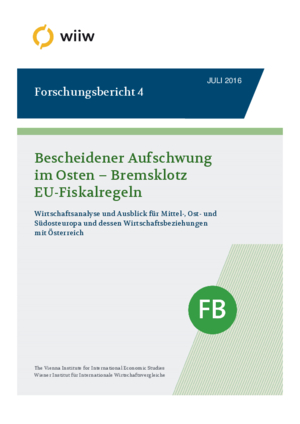Bescheidener Aufschwung im Osten – Bremsklotz EU-Fiskalregeln
wiiw Research Report in German language No. 4, June 2016
84 pages including 104 Tables and 22 Figures
Zusammenfassung
Bescheidener Aufschwung im Osten – Bremsklotz EU-Fiskalregeln
Für die mittel-, ost-und südosteuropäischen Länder (MOSOEL) ist das internationale Umfeld insbesondere von der trägen Erholung des Euro-Raumes gekennzeichnet. Die rigiden EU-Fiskalregeln sind der größte Bremsklotz für einen nachhaltigen wirtschaftlichen Aufschwung in Europa. Mittelfristig erwarten wir für die MOSOEL ein BIP-Trendwachstum von bis zu 3%. Dabei ist der Haushaltskonsum vor allem in den mittel- und osteuropäischen EU-Mitgliedstaaten wachstumsbestimmend. In den Ländern des Westbalkans können auch Investitionen und Nettoexporte als wichtige Wachstumstreiber identifiziert werden. In der Gemeinschaft Unabhängiger Staaten und der Ukraine scheint die Talsohle erreicht worden zu sein. Nach einer Phase der Stagnation kann auch dort ein leichtes Wachstum erwartet werden. Österreich sollte ein Profiteur von der Erholung in den MOSOEL sein, da es sich um wichtige Handelspartner handelt. Für die österreichische Wettbewerbsfähigkeit stellen die MOSOEL aber nur eine geringe Gefahr dar. Längerfristig steigen dort die Löhne stärker als die Produktivität. Die Folgen des BREXIT stellen ein großes Risiko für ganz Europa dar.
English Summary
Modest recovery in the East – EU fiscal rules act as obstacle to growth
The international environment for Central, East and Southeast Europe (CESEE) is affected by the weak recovery in the euro area. The rigid EU fiscal rules are an important obstacle to sustainable economic revival in Europe. Over the medium term, we expect a GDP trend growth rate of up to 3% for CESEE. Especially for the EU members of Central and Eastern Europe, household consumption will be an important component of economic growth. In the countries of the Western Balkans also investment and net exports will be important growth drivers. In the Commonwealth of Independent States and in Ukraine the economic downturn has bottomed out. After a period of stagnation, slow growth can be expected also there. Austria should gain from the recovery in CESEE, given that the region is home to important Austrian trading partners. These pose, however, only little danger for Austrian competitiveness. There, over the longer term wages will be rising faster than productivity. The BREXIT implications pose a substantial risk for all of Europe.
Reference to wiiw databases: wiiw Annual Database, wiiw Monthly Database
Keywords: macroeconomic analysis, international trade, competitiveness, consumption, investment, global financial crisis
JEL classification: E20, F34, G01, O52, O57, P24, P27, P33, P52
Countries covered: Albania, Belarus, Bosnia and Herzegovina, Bulgaria, Croatia, Czechia, Estonia, Hungary, Kazakhstan, Kosovo, Latvia, Lithuania, North Macedonia, Montenegro, Poland, Romania, Russia, Serbia, Slovakia, Slovenia, Turkey, Ukraine
Research Areas: Macroeconomic Analysis and Policy, Labour, Migration and Income Distribution, International Trade, Competitiveness and FDI, Sectoral studies
Press Releases
Related Presentations
- Bescheidener Aufschwung im Osten - Bremsklotz EU-Fiskalregeln - Neue Unsicherheiten durch BREXIT (press conference presentation in German)
- Modest recovery in the East - EU fiscal rules act as obstacles to growth - New uncertainties due to BREXIT (press conference presentation in English)
